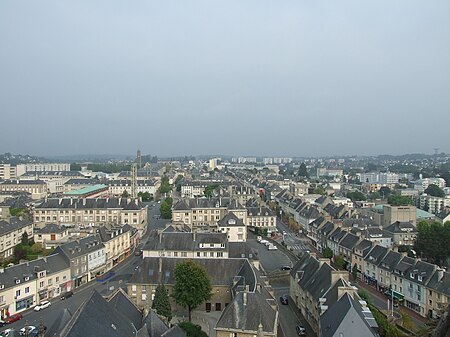Operation Cobra was an offensive launched by the First United States Army under Lieutenant General Omar Bradley seven weeks after the D-Day landings, during the Normandy campaign of World War II. The intention was to take advantage of the distraction of the Germans by the British and Canadian attacks around Caen in Operation Goodwood, and thereby break through the German defenses that were penning in their forces, while the Germans were unbalanced. Once a corridor had been created, the First Army would then be able to advance into Brittany, rolling up the German flanks once free of the constraints of the bocage country. After a slow start, the offensive gathered momentum and German resistance collapsed as scattered remnants of broken units fought to escape to the Seine. Lacking the resources to cope with the situation, the German response was ineffectual and the entire Normandy front soon collapsed. Operation Cobra, together with concurrent offensives by the British Second Army and the Canadian First Army, was decisive in securing an Allied victory in the Normandy campaign.
Having been delayed several times by poor weather, Operation Cobra commenced on 25 July 1944, with a concentrated aerial bombardment from thousands of Allied aircraft. Supporting offensives had drawn the bulk of German armored reserves toward the British and Canadian sector and, coupled with the general lack of men and materiel available to the Germans, it was impossible for them to form successive lines of defense. Units of the U.S. VII Corps led the initial two-division assault, while other First U.S. Army corps mounted supporting attacks designed to pin German units in place. Progress was slow on the first day but opposition started to crumble once the defensive crust had been broken. By 27 July, most organized resistance had been overcome and the VII and VIII Corps advanced rapidly, isolating the Cotentin Peninsula.
By 31 July, XIX Corps had destroyed the last forces opposing the First Army, which emerged from the bocage. Reinforcements were moved west by Field Marshal Günther von Kluge and employed in various counterattacks, the largest of which, Unternehmen Lüttich (Operation Liège), was launched on 7 August between Mortain and Avranches. Although this led to the bloodiest phase of the battle, it was mounted by already exhausted and understrength units and was a costly failure. On 8 August, troops of the newly activated Third United States Army captured the city of Le Mans, formerly the German 7th Army headquarters. Operation Cobra transformed the high-intensity infantry combat of Normandy into rapid maneuver warfare and led to the creation of the Falaise pocket and the loss of the German strategic position in northwestern France.








